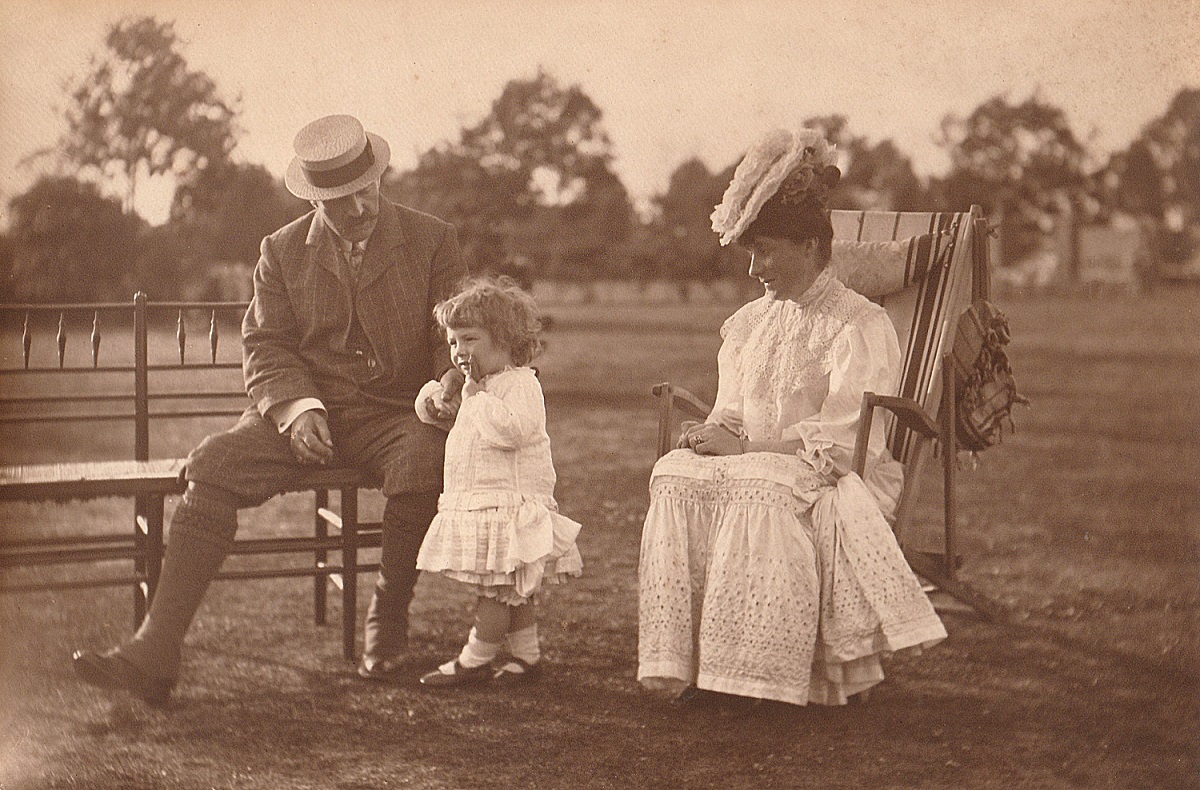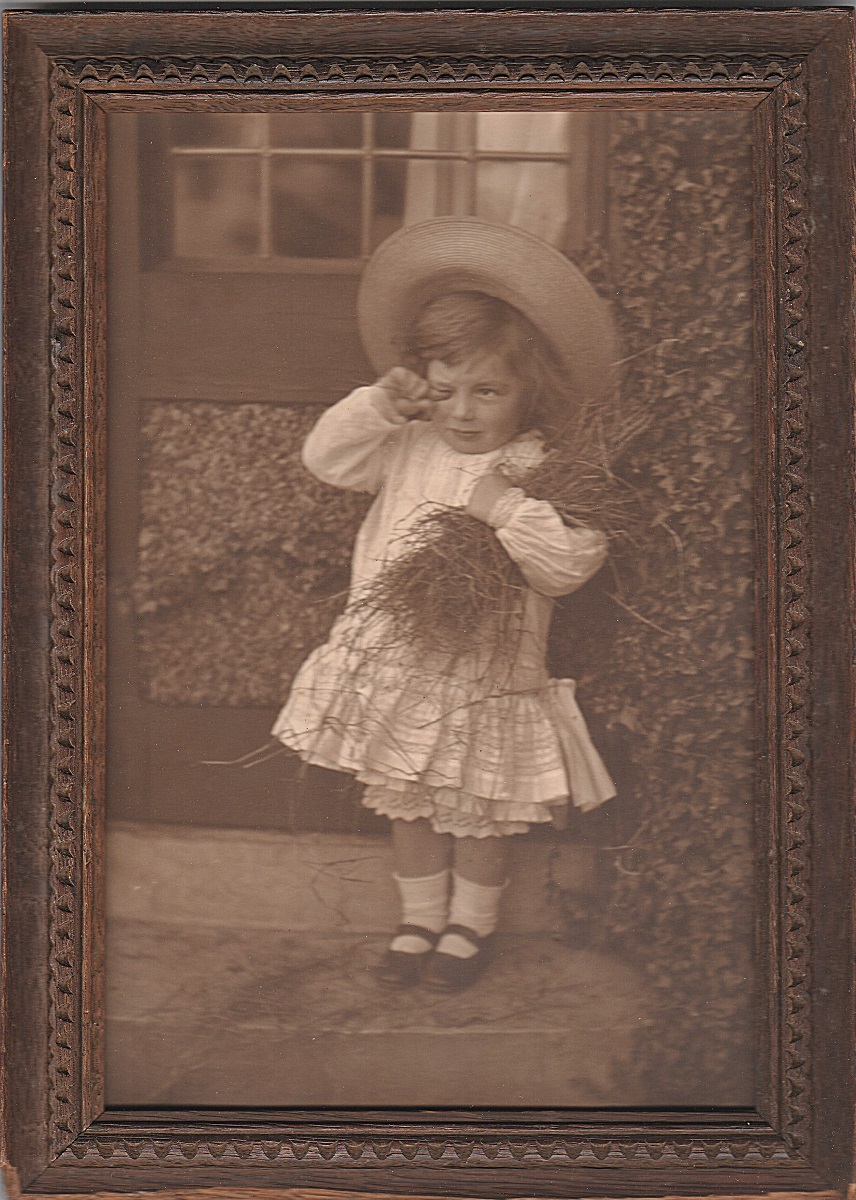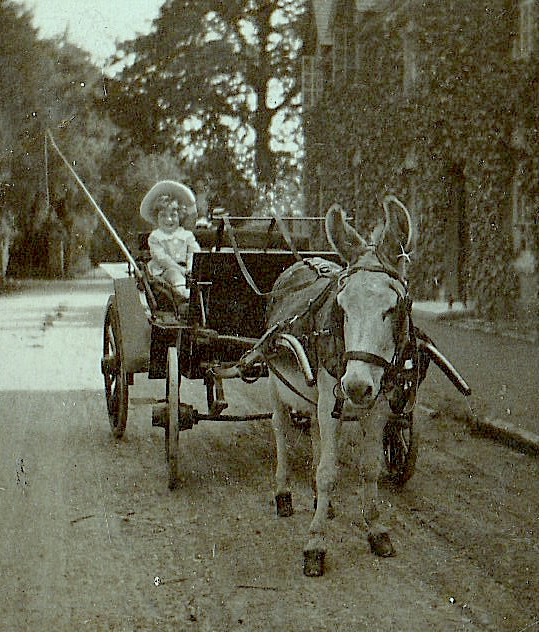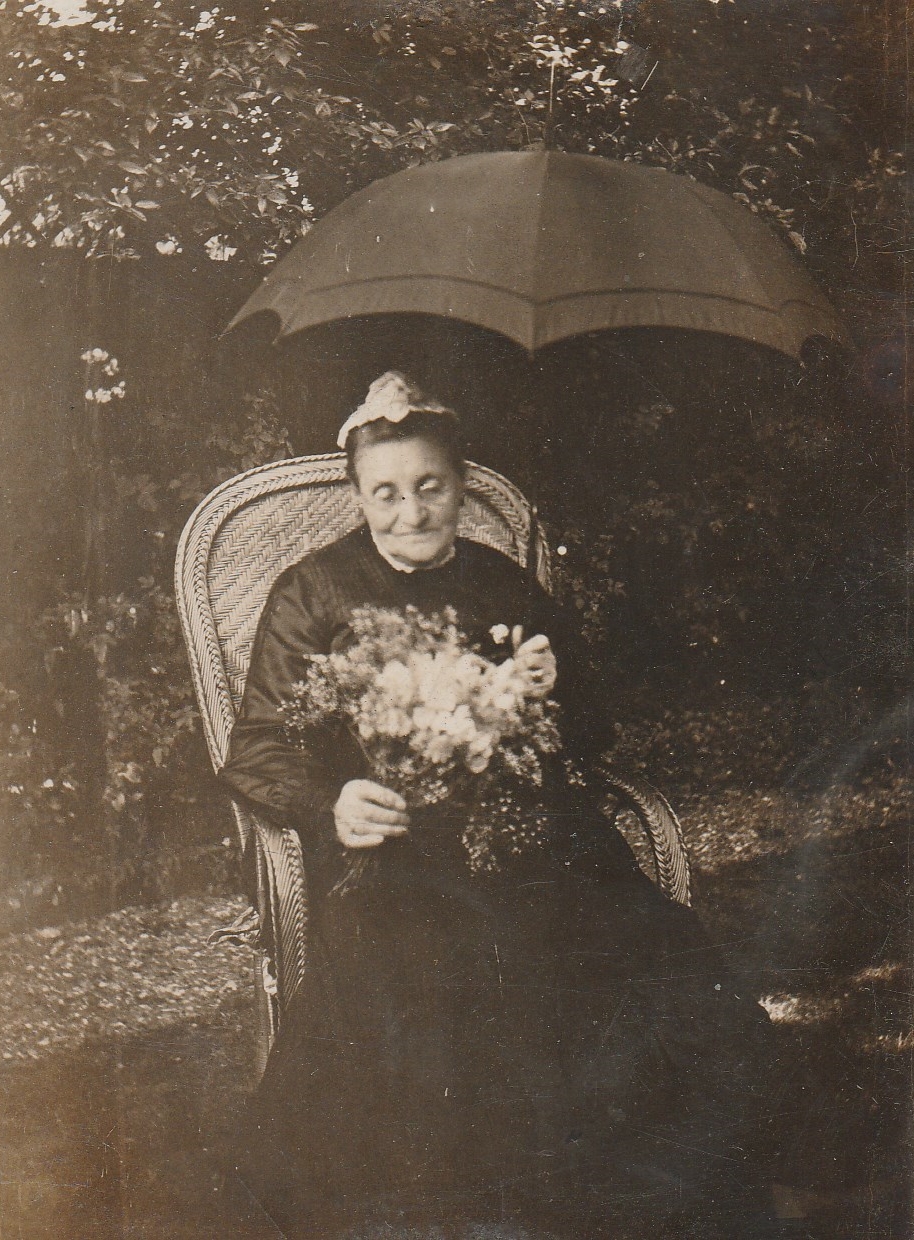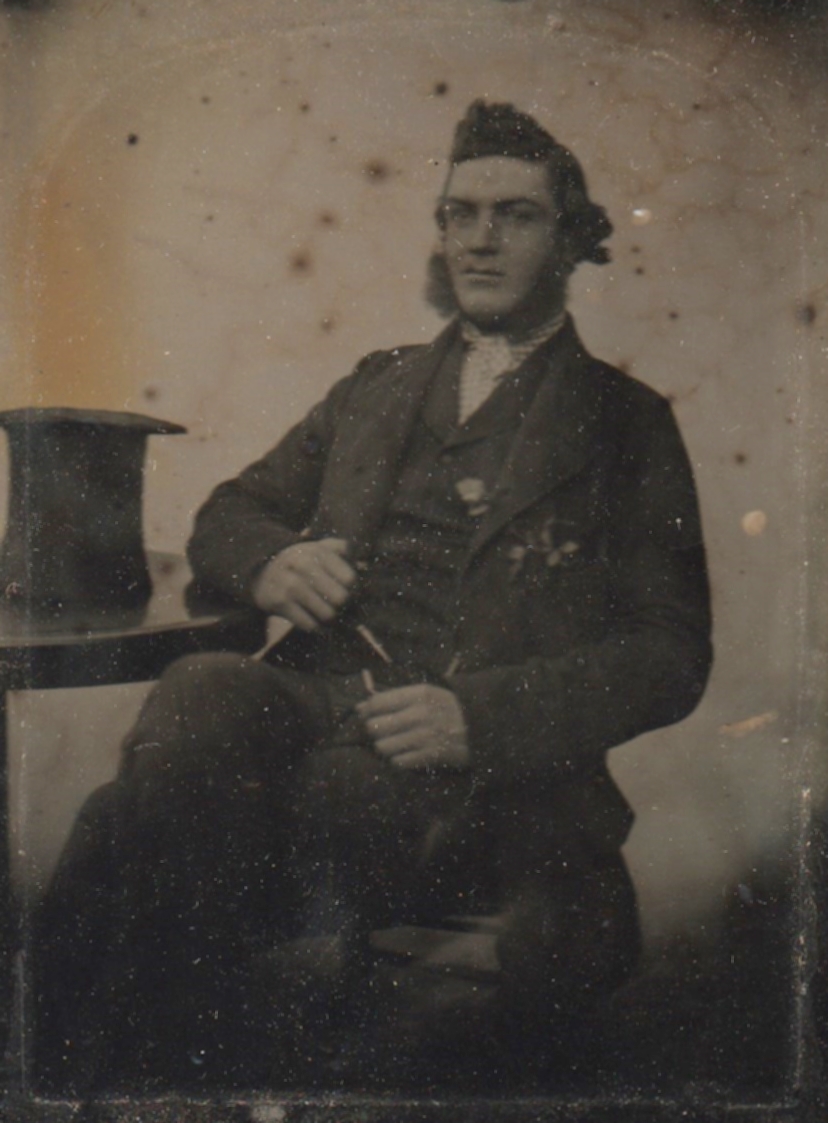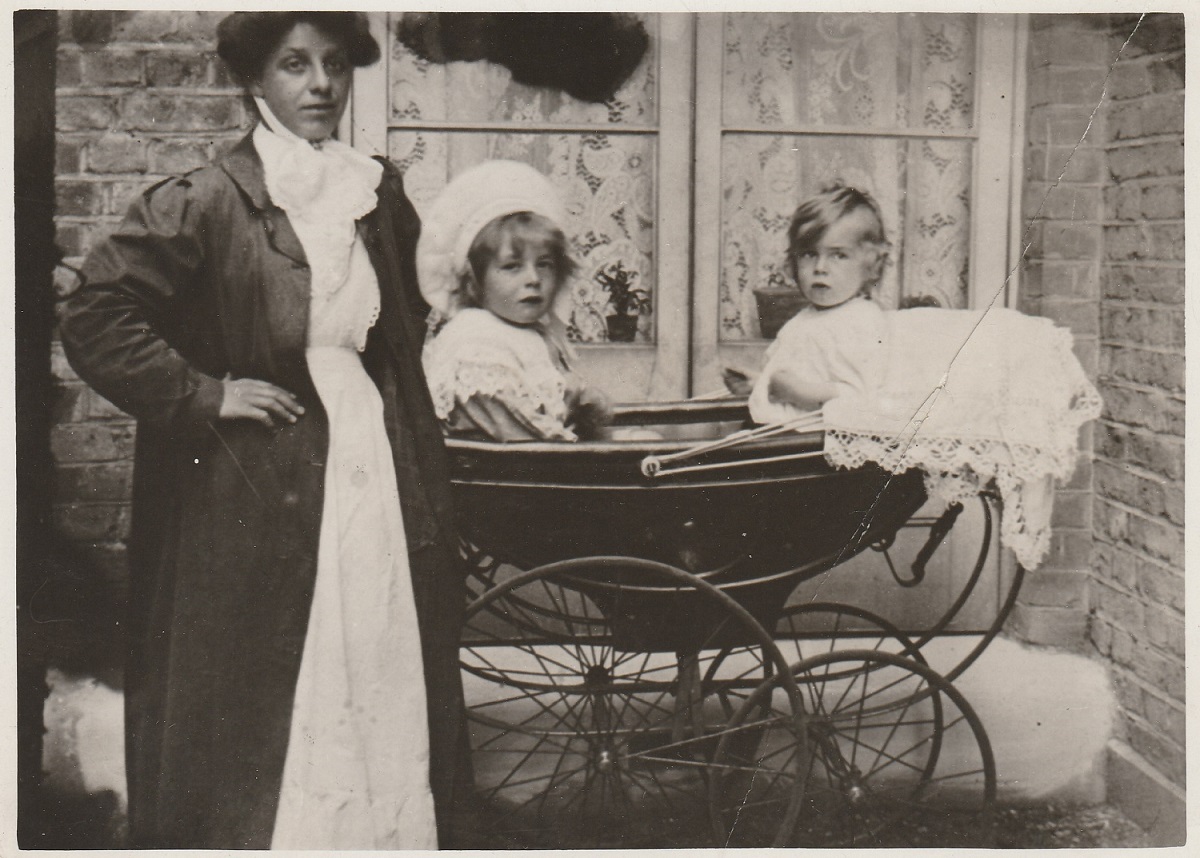


I was born on the 24th January 1904 in Wandsworth. I have forgotten the name of the road, it is not important, and it is said that whilst waiting for me to arrive my father ate a whole Christmas pudding, cold.
But, of course, I know nothing of those days and my first memories are of No. 26, East Sheen Avenue, where we went to live sometime before 1914, and of my grandparents' house in Shrivenham, where I used to be taken to stay. We went, by steam train, to Swindon and there my grandfather met us with a horse and trap. I think it was called a high dog cart and to me it seemed a perilously long way from the ground. We drove through the country and at one point passed a small shed from which most of the roof had gone and inside was a thin cow. This made a great impression on me and for weeks I was asking why the shed had no roof to it and why the cow's bones stuck out so.
In those days, my grandfather was agent to the Viscount Barrington* and had a large house and garden a few yards from the park. This was a private park but we were allowed to go in it. There were tall iron gates of which we had the key and an avenue of big trees on either side which met overhead. It was dark in there, green dark and damp, and lords and ladies grew under the trees. My Aunt Jess told me they screamed if you pulled them out of the ground.
* Walter Barrington, 9th Viscount Barrington (20 April 1848 - 12 September 1933). GRH
A little stream ran through the park and once my aunt and I disturbed a swan sitting on its nest. The angry bird chased us all the way to the park gates, its huge wings beating, its neck stretched forward. It hissed. We ran. It was just behind us and we were terrified.
My grandfather was a very big strong man, over six feet tall, and broad, and he had a long white beard. When I sat on his knee, he used to rub his beard against my face, saying this would make my beard grow when I grew up.
He spoiled me. I always sat next to him at meal times and he would cut me the choicest bits and at tea insisted on putting so much homemade strawberry jam on thin brown bread and butter for me that it was impossible to lift the slice without it collapsing and making me very sticky.
My grandmother was tiny, only about five feet high. She wore steel rimmed spectacles. I called her Little Granny. I used to ask her to draw for me, particularly chickens, and she got very worried because she could not. She had a four-wheeled donkey cart and would take me for drives in it. The donkey was beautifully groomed, his hooves were varnished and he wore light brown harness.
Little boys were not dressed so sensibly in those days as they are now and my hair, which was of a tawny colour, fell to my shoulders. I remember how I hated being stood on the table and having it combed, and being dressed in stiffly starched linen frocks. But there were compensations, for my party dress was of black velvet with wide real lace collar and lace cuffs, and with white socks and silver buckled black patent leather shoes my vanity was greatly flattered.
In the loft there was a cat with a litter of kittens. I loved to play with them. And in the garden a huge walnut tree. The nuts lay on the ground and I was allowed to eat as many as I liked.
One day I was taken to visit a neighbour, an old lady, a Miss Wilson. Seated on a plain wooden chair, she received us in what persists in my memory as a walled-in gravelled yard. She was dressed in black and all around her jet black chickens pecked at the ground. I refused to speak to her, cried and stood awkwardly with my feet turned in. She asked my aunt if there was anything wrong with my legs. When we got home I said she frightened me. She was a witch.
I remember my uncle Ernest once came for a weekend. My father and I got up early and threw little stones at his bedroom window. The window opened, Ernest's head appeared and he poured a glass of water over us. But he had forgotten that his false teeth were in the glass and they broke when they hit the ground.
One last recollection of Shrivenham. Of a warm summer evening when I had been put to bed a little earlier, protestingly, than usual because the grown ups wanted to play tennis. I could not sleep and got up, climbed on a seat by the open window and watched the game. I leaned out too far, there was a shriek and I was grabbed from behind. My aunt had just come into the room to see if I was asleep and had literally caught me as I was falling.
This was my second escape from disaster, for as a tiny baby my mother accidently poured a cup of hot tea over my face when I was in bed with her, they took a baby into bed with them in those days, and for years my face was pitted and only gradually the tiny holes filled up.
East Sheen avenue is still where it was, a turning off the Upper Richmond Road running a little uphill in the direction of Richmond Park. It is a tree lined road of small semi-detached suburban houses but when we lived there building on our side had stopped and there was a field next to our house. At the top of the road there were more fields, on the left-hand side, stretching down to market gardens, which bordered the main Upper Richmond Road, and up to Sheen Common, through which one could walk to the Roehampton Gate of Richmond Park. There was a farm there too, and in summer, haymaking in the fields, riding in the hay carts, drinks of warm milk straight from the udder when we went to the farm and once, a vivid glimpse of a bull covering a cow whilst two men beat the bull with sticks, to encourage it, I suppose. We came on this unawares and our nurse, suddenly confused, turned our faces away and hurried off. I think my brother was there too. We had no idea what was going on and were given no explanation.
It was on the road leading to the Common that I learned to ride my first bicycle and fell off into a huge bed of nettles.
The Common was wonderful, wild and uncared for, as commons should be. Just inside the gate, on the left, was a pond covered with green duck weed and at the right season full of newts and tadpoles, and close by the pond was a well with a round base of stone and a U-shaped arch of black iron above it. Its water was said to be particularly good for the eyes and old women sometimes let down bottles on strings, and pulling them up, corked them and carried them away. Beverley Brook bordered on the Common, which in the spring was a mass of white May blossom. It was here I once saw some boys and girls bathing without any clothes on. The little girls, they must have been ten or twelve, fascinated me and they did not mind being looked at.
These were still the days of horses and a motor car was a rarity. Omnibuses and trams, tradesmen's carts and vans were horse drawn and on Derby Day huge brakes pulled by four horses could be seen full of shouting and laughing men and women. Some of the women wore ostrich feathers in their hats and some exchanged their hats with the men. They waved sticks with streamers of pink or blue coloured paper and when the brakes pulled up at the Derby Arms for beer the horses had their half pint poured down their throats.
From our bedroom, my brother's and mine, we could look towards the fields. On Saturday evenings we always watched the horses go by, and there were a great many of them, running free except for a few ridden bareback by boys who kept the loose ones together. Huge carthorses with long manes and tails and hair partly covering their great hooves, the smart little cobs, their tails docked, that during the week pulled the butchers' carts, and the horses used by the milkmen in their chariots that held a big churn and clanking milk tins. A whole troupe of horses now free of carts and harness, off to their Sunday rest. They passed quickly in a cloud of dust, their hooves made a lot of noise and some neighed. How we envied the boys in charge of them. And very early on Monday mornings they would awaken us as they were driven back to begin another week of work.
The fields are all built over now and the buildings are commonplace. The horses long since dead and the petrol engine has taken their place. What was Sheen Common remains, that is to say the space it occupied remains. The pond has been cleaned and I am sure no newts or tadpoles could live there. The Common has asphalt paths. It is tidy and cared for. It is a planned Borough Council, Welfare State wilderness. I never want to see it again. I expect the farm has gone too, it must have; but after seeing, some years ago, what had been done to the Common I did not dare to look.
We went to our first school, kept by two middle-aged ladies, sisters, the Misses Doughty. It was in Elm Road and not far from home. One Miss Doughty was tall and kind, her sister was smaller, thinner and stricter but both were patient. They taught me to read and write, to do addition and subtraction, multiplication and long and short division. I was very slow to learn, bad at arithmetic, I still am, and particularly slow at reading but when at last I did learn to read I read anything I could get hold of. I only remember two of my fellow pupils at Elm House School. There was Nancy, a bank manager's daughter, I always quarrelled with her, and Edward Reynell who is still my friend. A few years older than myself, he was high spirited always and used to try to make me join him in snatching an apple as we passed a fruit stall on the way home from school. I was never bold enough but he sometimes succeeded and we ran.
EARLY LIFE MEMOIR -1
Clifford Hall, aged 2, with his parents
Clifford Hall at 2 years old
Young Clifford in Grandma's Donkey Carriage
'Little Granny' Eliza Hall (1838 - 1912).
Henry Clifford Hall (1836 - 1917). This the only known photo of Clifford Hall's paternal grandfather.
Clifford Hall with his younger brother, Brian, circa 1907.
